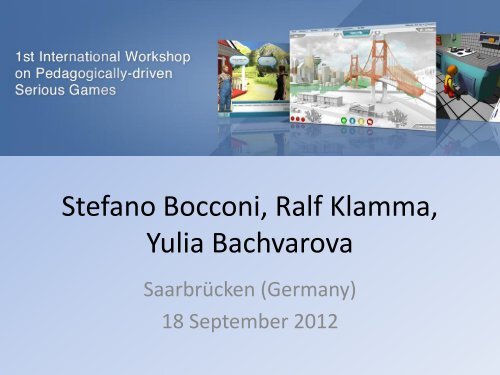Stefano Bocconi, Ralf Klamma, Yulia Bachvarova - Cyntelix
Stefano Bocconi, Ralf Klamma, Yulia Bachvarova - Cyntelix
Stefano Bocconi, Ralf Klamma, Yulia Bachvarova - Cyntelix
You also want an ePaper? Increase the reach of your titles
YUMPU automatically turns print PDFs into web optimized ePapers that Google loves.
<strong>Stefano</strong> <strong>Bocconi</strong>, <strong>Ralf</strong> <strong>Klamma</strong>,<br />
<strong>Yulia</strong> <strong>Bachvarova</strong><br />
Saarbrücken (Germany)<br />
18 September 2012
INITIAL NEED<br />
• Game-based learning scenario, pedagogical framework of<br />
Variation Theory (vary and contrast issues so that their<br />
boundaries and essences are more apparent)<br />
• Approach: influence the agents by changing their BDI<br />
values.<br />
• Drawbacks:<br />
– Ad-hoc solution<br />
– difficult to understand if feasibility (not being agent experts)<br />
• What about a programmable abstraction of the artificial<br />
world with which to specify the principles of Variation<br />
theory?
VISION
SIMPLIFIED (1)
SIMPLIFIED (2)
POINTS<br />
• Formalizations of pedagogical theories<br />
• Models of interdependencies between<br />
pedagogical theories, storytelling and game<br />
mechanics<br />
• (Agent-based) architectures or existing<br />
systems where all (or some of) the above<br />
comes together
RESULTS<br />
• Insights<br />
• Collaborations<br />
• A flipchart<br />
• Journal Special Issue
SUPPORTING<br />
PROJECTS<br />
www.reachyourtarget.org<br />
www.galanoe.eu
PROGRAM<br />
http://www.cyntelix.com/workshop-programme.aspx
START<br />
Here we go!!
Statements (1)<br />
1) Serious Games are based on a tight integration of narrative,<br />
pedagogy and game mechanics. One cannot be modified in isolation<br />
without modifying the others. The perspective of having a<br />
“pluggable” game architecture where components can be replaced is<br />
therefore not realistic, and Game engines do not make sense, since<br />
they are only able to generate the same game.<br />
2)Reusability is not possible, a game is always a unique and ad-hoc<br />
product<br />
OR<br />
Reusability is possible, namely with respect to these features: ……
Statements (2)<br />
3)Pedagogy cannot be formalized to an extent needed to have a<br />
pedagogical engine, i.e. a software component that can influence<br />
game features at runtime to achieve a pedagogical effect.<br />
4) Serious games for learning cannot be fun because learning as such<br />
is characterized by struggle, experiencing difficulties and feeling of<br />
unease<br />
OR<br />
Serious games for learning are not fun NOW because the<br />
interrelation between pedagogical principles and game principles<br />
related to engagement and intrinsic motivation are not studied and<br />
well understood yet, let alone implemented in serious games
Statements (3)<br />
5) Gamification is on the rise, the field of serious games is declining.<br />
Commercial games for fun continue to be an ever growing industry.<br />
We need to improve Serious Games<br />
OR<br />
We do not need Serious Games, we can just gamify learning<br />
6) Should aspects such as pedagogy, psychology, storytelling<br />
approaches, game principles (flow, immersion, etc), AI techniques all<br />
be involved in the design of SG<br />
OR<br />
Is this approach not feasible/too complex/not useful?
Statements (4)<br />
7) What would be the most exciting future<br />
research directions in serious games


